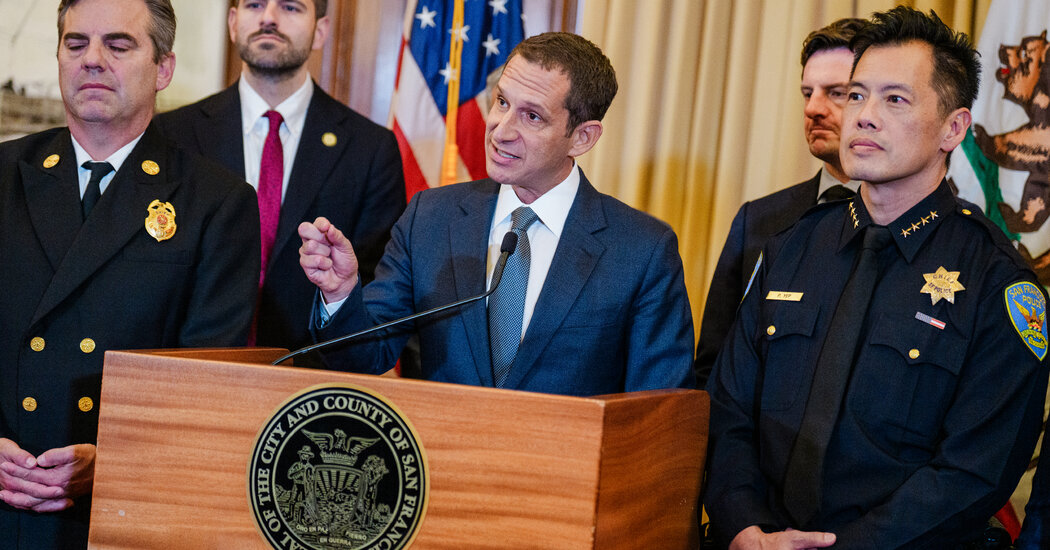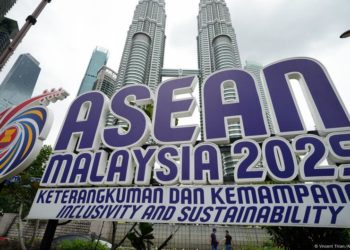Mayor Daniel Lurie of San Francisco did what he does best after the Trump administration prepared to send border agents to the Bay Area for a major crackdown on immigration this week.
He stayed calm. He worked the phones.
He “power mapped.”
In doing so, Mr. Lurie and his team visualized concentric circles of prominent business leaders who could persuade President Trump and determined who might lobby the executives to make those important calls. They wanted to deliver the message, in the most diplomatic way possible, that San Francisco was not the apocalyptic landscape that the president sees on Fox News.
Soon, a host of billionaires with strong ties to the city were on the phone with Mr. Trump and Vice President JD Vance, a former venture capitalist in San Francisco.
Four people familiar with the situation described the City Hall discussions to The New York Times on condition of anonymity because they were not authorized to speak publicly.
Mr. Lurie, 48, a philanthropist and an heir to the Levi Strauss denim fortune, had never served in elected office until he became San Francisco’s mayor in January. To some fellow Democrats, he has been too scripted at a time that has called for brash leadership to counter Mr. Trump. Some have also resented his connections with tech billionaires.
But Mr. Lurie’s supporters say that his approach was simply an extension of his quiet leadership and his ability to work the levers behind the scenes in ways that few others can.
He leaned on Sam Altman, the chief executive of OpenAI and a resident of the city’s Russian Hill neighborhood, who served on the mayor’s transition team before his inauguration. He relied on Marc Benioff, the Salesforce chief executive who was eager to move past his viral comments calling on Mr. Trump to send the National Guard to San Francisco — words he later recanted and apologized for.
He received help from Jensen Huang, the chief executive of the chipmaker Nvidia and the owner of a mansion on San Francisco’s Billionaire’s Row.
Ron Conway, the venture capitalist known as the Godfather of Silicon Valley, also lobbied behind the scenes. He called Republicans he thought could persuade Mr. Trump to back off.
Mr. Lurie wanted the intermediaries to be factual, persuasive, private and totally noncombative. That has been the mayor’s modus operandi since his inauguration.
Mr. Trump called Mr. Lurie late Wednesday night, and by the end of the conversation, the president had agreed to call off the surge in San Francisco that he had planned for Saturday, according to his post on Truth Social. Mr. Trump also said the tech leaders had vouched for the mayor’s efforts to increase public safety in San Francisco.
“I spoke to Mayor Lurie last night and he asked, very nicely, that I give him a chance,” Mr. Trump posted on Truth Social Thursday morning. “The people of San Francisco have come together on fighting Crime, especially since we began to take charge of that very nasty subject.”
It was perhaps the most positive message Mr. Trump had delivered about San Francisco — or any Democratic-run city — this year. He has falsely said that Portland is “burning down” and that Chicago is a “war zone.”
Brian Brokaw, a Democratic political strategist who ran a fund-raising committee that supported Mr. Lurie’s mayoral campaign, said that it was natural for the mayor to work behind the scenes and not engage in political battle with Mr. Trump.
He said Mr. Lurie had taken plenty of heat from donors and activists in San Francisco who wanted him to be more of a firebrand in speaking out this year, but he was not deterred.
“At his core, he’s not a politician,” Mr. Brokaw said. “He never has been a politician, and performative actions for the sake of performance have never been his calling card.”
The mayor has focused this year on making small improvements to San Francisco, a city still recovering from the double whammy of a pandemic that hollowed out its downtown core and a deadly fentanyl epidemic that has killed thousands of people in the city in the past five years.
He has been a relentless cheerleader for San Francisco, posting constantly on Instagram about his jaunts around the city — surfing at Ocean Beach, jogging in Golden Gate Park or eating doughnuts at a bakery. “Let’s go, San Francisco!” he often says.
He has avoided discussing national politics so much that he even refuses to say the name Trump in public. He rarely goes off message and does not seem particularly comfortable in front of cameras.
Mr. Lurie said during a Thursday news conference at City Hall that he had spoken that morning to Kristi Noem, the homeland security secretary, and Attorney General Pam Bondi. He said he had agreed to have the city work with Ms. Bondi on an effort to “combat fentanyl and hold drug traffickers accountable.”
While San Franciscans breathed a sigh of relief that a federal incursion was no longer days away, some were concerned that he might have made concessions to Trump administration members reviled by many Democrats.
Supervisor Jackie Fielder, who represents the Mission District, a heavily Latino neighborhood, said she had texted Mr. Lurie on Thursday to say that his actions were “shameful.” She said that he should not have welcomed any federal agencies into San Francisco because they could easily try to arrest immigrants and provoke violence.
“I don’t know what world the mayor is living in,” Ms. Fielder said.
There was also some resentment that Mr. Lurie had secured safety for San Francisco without getting similar assurances for the surrounding Bay Area. (He said in his news conference that he and the president had talked only about San Francisco.)
Across the bay in Oakland, Mayor Barbara Lee, other local leaders and activists were concerned that Mr. Trump might still conduct intensive raids in their city. The president said in August that he was eyeing Oakland for federal action because of what he called its high crime rates.
Some wondered if race had played a role in the president’s thinking — and in his ultimate reversal in San Francisco this week. Though Portland, Ore., has a white mayor, most of the cities targeted by Mr. Trump so far have Black mayors.
“Some folks think that this means that he’ll turn around and zero in on Oakland,” said Cat Brooks, a local activist and executive director of the Anti Police-Terror Project. “There’s more Black people here. There’s a Black mayor.”
Mr. Trump’s administration has said it targets cities based on crime rates, not because of the race of their mayors.
Mayor Brandon Johnson of Chicago has taken an approach different from that of Mr. Lurie, sparring with the president as Mr. Trump has attempted to send the National Guard into his city. In an interview on Thursday, he said that the influence of wealthy tech leaders in sparing San Francisco was “proof positive” that the federal incursions were not motivated by data or concerns about safety.
“It’s very obvious that this is political, and he essentially only listens to billionaires,” Mr. Johnson said. “If the only way in which you can communicate with this president is to be a billionaire, that leaves out the vast, vast majority of everyday people.”
Mr. Johnson said it was of paramount importance that people continue to resist, regardless of what worked for Mr. Lurie in San Francisco.
“Perhaps there are folks who believe that somehow if you just close your eyes, he’ll leave you alone,” he said. “That’s not how we protect our democracy in this moment.”
Still, in San Francisco, many leaders were grateful for Mr. Lurie’s maneuvers. Nancy Pelosi, the former House speaker, praised his “exceptional leadership.”
“I salute Mayor Lurie for standing up for our city and reinforcing San Francisco’s strength, optimism and recovery,” she said in a statement.
Mr. Lurie’s quiet, head-down demeanor has stood out this year, especially in a city accustomed to strong voices like Ms. Pelosi and larger-than-life mayors like Gavin Newsom and Willie Brown.
The latter was where he always is on a Thursday afternoon: the corner table of Sam’s Grill downtown, munching on sourdough bread. Mr. Brown, 91, praised Mr. Lurie for ensuring that the president ultimately received a factual portrayal of San Francisco.
“He clearly had very good, quality, smart advice on dealing with Trump,” said Mr. Brown, known as one of the savviest politicians in modern California history.
“He is really either unusually talented or lucky,” Mr. Brown continued to say about the new mayor. “I go with luck.”
Reporting was contributed by Cade Metz in San Francisco and Laurel Rosenhall in Sacramento.
Heather Knight is a reporter in San Francisco, leading The Times’s coverage of the Bay Area and Northern California.
Kellen Browning is a Times political reporter based in San Francisco.
The post How the San Francisco Mayor Avoided Trump’s Enforcement Surge appeared first on New York Times.




